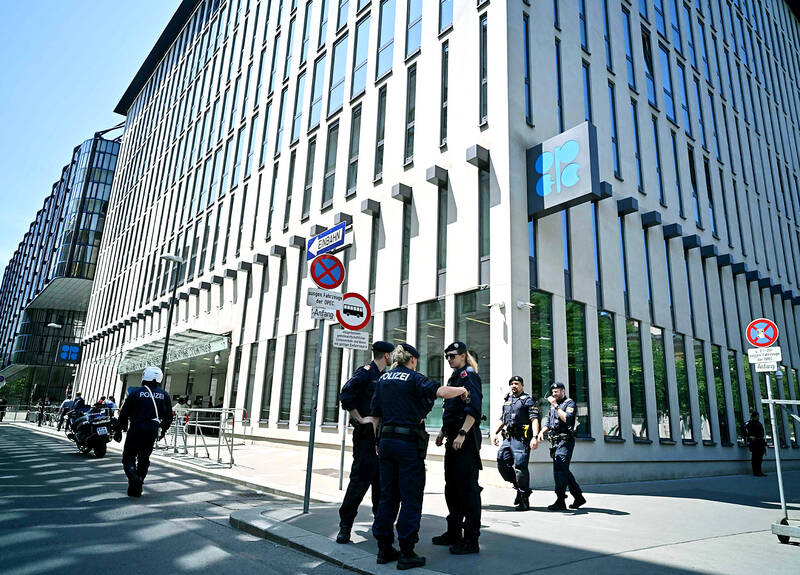There are growing signs that major oil producers led by Saudi Arabia and Russia would consider slashing production in meetings to prop up prices.
The 13-member OPEC is due to consult with 10 other oil-producing nations, including Russia, to review the group’s future output policy.
The in-person OPEC+ meetings were set to begin yesterday in Vienna.

Photo: AFP
Analysts had expected OPEC+ producers to maintain their current policy, but signs emerged on Saturday that staying the course might fall short of stabilizing the oil market.
In April, several OPEC+ members agreed to voluntarily cut production by more than 1 million barrels per day (bpd) — a surprise move which briefly buttressed prices, but failed to bring about lasting recovery.
Oil producers are grappling with falling prices and high market volatility amid the Russian invasion of Ukraine, which has upended economies worldwide.
Most delegations remained tight-lipped or declined to comment on possible policy decisions as they arrived in the Austrian capital for meetings on Saturday.
Analysts were divided over whether heavyweights Riyadh and Moscow would keep the group on course with its current output policy, or further curtail production.
An output cut of 700,000 bpd to 1 million bpd was one of the options being discussed, a source close to the discussions said, adding that nothing was set in stone.
“There was no discussion of production volume today,” Iranian Deputy Oil Minister for International Affairs Amir Hossein Zamaninia said on Saturday, adding that all options remained “on the table” for yesterday’s gathering.
Oil prices have plummeted by about 10 percent since the April cuts were announced, with Brent crude falling close to US$70 per barrel, a level it has not traded below since December 2021.
Traders worry that demand could slump, with concerns about the health of the global economy as the US battles inflation with higher interest rates and China’s post-COVID-19 rebound stutters.
Arriving in Vienna, where OPEC is headquartered, Emirati Minister of Energy Suhail al-Mazrouei said that he expected the outcome of yesterday’s ministerial meeting to “balance the market and ensure we are ready for any challenges in the future.”
It remains to be seen whether Riyadh would convince Moscow to curtail output, as Russia is dependent on oil revenues with its war in Ukraine dragging on and Western sanctions hitting its economy.
Russian Deputy Prime Minister Alexander Novak “sees no need for OPEC+ to change course,” because it would hardly benefit from higher prices, Commerzbank AG commodity analysts said in a research note.
Russia has been shipping its oil to India and China.
Saudi Arabia “does need higher prices to balance its budget,” Commerzbank analysts said, adding that the kingdom’s break-even price is “at a good 80 [US] dollars per barrel.”
Despite recent tensions, OPEC+ top producers “will no doubt be keen to keep the cartel together, as it has more power thanks to the united front it is showing,” they added.

Semiconductor business between Taiwan and the US is a “win-win” model for both sides given the high level of complementarity, the government said yesterday responding to tariff threats from US President Donald Trump. Home to the world’s largest contract chipmaker, Taiwan Semiconductor Manufacturing Co (TSMC, 台積電), Taiwan is a key link in the global technology supply chain for companies such as Apple Inc and Nvidia Corp. Trump said on Monday he plans to impose tariffs on imported chips, pharmaceuticals and steel in an effort to get the producers to make them in the US. “Taiwan and the US semiconductor and other technology industries

SMALL AND EFFICIENT: The Chinese AI app’s initial success has spurred worries in the US that its tech giants’ massive AI spending needs re-evaluation, a market strategist said Chinese artificial intelligence (AI) start-up DeepSeek’s (深度求索) eponymous AI assistant rocketed to the top of Apple Inc’s iPhone download charts, stirring doubts in Silicon Valley about the strength of the US’ technological dominance. The app’s underlying AI model is widely seen as competitive with OpenAI and Meta Platforms Inc’s latest. Its claim that it cost much less to train and develop triggered share moves across Asia’s supply chain. Chinese tech firms linked to DeepSeek, such as Iflytek Co (科大訊飛), surged yesterday, while chipmaking tool makers like Advantest Corp slumped on the potential threat to demand for Nvidia Corp’s AI accelerators. US stock

The US Federal Reserve is expected to announce a pause in rate cuts on Wednesday, as policymakers look to continue tackling inflation under close and vocal scrutiny from US President Donald Trump. The Fed cut its key lending rate by a full percentage point in the final four months of last year and indicated it would move more cautiously going forward amid an uptick in inflation away from its long-term target of 2 percent. “I think they will do nothing, and I think they should do nothing,” Federal Reserve Bank of St Louis former president Jim Bullard said. “I think the

SUBSIDIES: The nominee for commerce secretary indicated the Trump administration wants to put its stamp on the plan, but not unravel it entirely US President Donald Trump’s pick to lead the agency in charge of a US$52 billion semiconductor subsidy program declined to give it unqualified support, raising questions about the disbursement of funds to companies like Intel Corp and Taiwan Semiconductor Manufacturing Co (台積電). “I can’t say that I can honor something I haven’t read,” Howard Lutnick, Trump’s nominee for commerce secretary, said of the binding CHIPS and Science Act awards in a confirmation hearing on Wednesday. “To the extent monies have been disbursed, I would commit to rigorously enforcing documents that have been signed by those companies to make sure we get